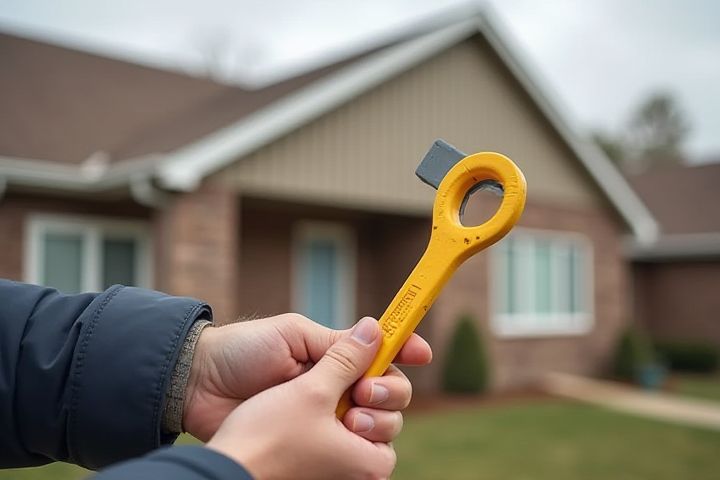
To find a house built to code, consult your local building department for specific standards and updates on construction regulations in your area. Request architectural blueprints and the home's history to verify compliance with zoning laws and building codes. Hiring a licensed home inspector can help identify any violations and assess the property's overall safety and structural integrity. Ensure that all permits are included in the documentation, indicating that inspections were performed during construction. Finally, consider researching the builder's reputation to assess their adherence to quality standards and building codes.
How To Find A House Built To Code
Verify city or county building permits.
To ensure a house is built to code, verify local building permits through your city or county's building department. These permits provide documentation that construction was approved by zoning and safety regulations, ensuring compliance with local codes. You can typically access permit records online or by visiting the local government office, which may require a small fee. Confirming that all required inspections were completed and passed during construction is crucial for your peace of mind and the home's safety.
Check certificate of occupancy.
To find a house built to code, focus on obtaining the certificate of occupancy (CO), a crucial document issued by local authorities confirming compliance with building codes and safety regulations. The CO verifies that the property meets all necessary standards, including electrical, plumbing, and structural integrity, ensuring your safety and legal protection. Before purchasing, request a copy from the seller or check with the local building department; properties lacking a CO may pose significant risks or additional costs. By prioritizing this document, you can make an informed decision and safeguard your investment.
Consult a licensed home inspector.
Consulting a licensed home inspector is crucial when searching for a house built to code. These professionals perform comprehensive evaluations, assessing structural integrity, electrical systems, plumbing, and compliance with local building codes. Expect a detailed report that includes specific findings, potential violations, and recommendations for repairs or improvements. Investing in this service can save you thousands in future renovations and ensure your new home is safe and habitable.
Confirm adherence to local building codes.
To confirm adherence to local building codes, first obtain a copy of your city or county's building code regulations, often available on their official website. During your property inspection, check for permits associated with any renovations or constructions; these should be readily accessible and documented. Engaging a qualified home inspector will further ensure that all structural components meet safety standards, including electrical and plumbing systems. You can also verify compliance by looking for a Certificate of Occupancy, which indicates that the building meets all applicable codes and standards before it was occupied.
Review builder's reputation and credentials.
To ensure you find a house built to code, start by meticulously reviewing the builder's reputation and credentials. Check for licenses, certifications, and affiliations with reputable industry organizations, such as the National Association of Home Builders (NAHB). Look for online reviews and ratings from previous clients, focusing on their experiences regarding compliance with building standards. Your due diligence in assessing these factors can significantly lower the risk of encountering code violations in your new home.
Ask for warranty and insurance details.
When searching for a house built to code, it's crucial to ask the seller for warranty and insurance details, as these documents provide insights into the home's compliance with local building regulations. A well-constructed home often comes with a warranty that covers structural defects, typically lasting one to ten years, depending on state laws. Additionally, inquire about the builder's insurance, which should include general liability and workers' compensation, safeguarding you against potential claims arising from construction defects. Verifying these details can give you confidence in your investment and help ensure your new home meets all safety and quality standards.
Inspect construction quality and materials.
Inspecting construction quality and materials is crucial to determine if a house meets building codes. Look for high-quality materials such as concrete with a compressive strength of at least 3,000 psi, properly installed roofing materials, and energy-efficient insulation rated at R-30 or higher. Evaluate the structural integrity by checking for even framing, secure fasteners, and the presence of proper load-bearing walls. You can also review permits and inspection reports that confirm adherence to local building codes and regulations.
Look into past renovations or additions.
Investigate any past renovations or additions by reviewing public records, which often detail permits issued and the scope of work completed. Check local building departments to ensure that all modifications were executed with the necessary approvals, as violations can indicate non-compliance with current building codes. Request documentation from the seller, including inspection reports, to verify that these updates met safety standards at the time. Your diligence in examining these factors will help ensure that the house adheres to local regulations and minimizes future liabilities.
Ensure compliance with zoning laws.
To find a house built to code, start by researching local zoning laws, which dictate property use, dimensions, and placement. These laws typically vary by municipality, so consult your city or county's planning department to obtain specific regulations. Inspect property records to confirm that the house has passed necessary inspections and received occupancy permits, indicating compliance with local building codes. Engaging a qualified home inspector or real estate agent familiar with local codes can further ensure the home aligns with zoning requirements.
Consult local building department records.
Consulting local building department records is essential for finding a house built to code. Typically, you can access documents that include inspection reports, permits, and compliance certificates, which confirm adherence to local, state, and federal construction regulations. Ensure you review the property's history, including any updates or renovations that might have occurred, as these often require new permits. You may also want to inquire about compliance inspections conducted during the construction phase to ensure that all safety standards were met.
